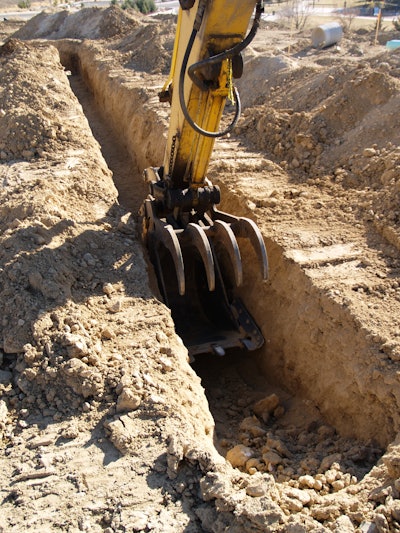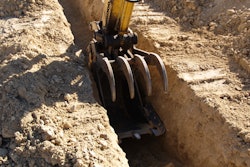
A federal judge has upheld an $11,747 U.S. Occupational Safety & Health Administration citation against a Colorado contractor whose employee died when an excavator bucket detached from a quick-coupler device and struck him.
American Civil Constructors has indicated through its attorney that it will appeal the decision by Judge Brian A. Duncan.
According to OSHA the citation, the company failed to furnish a place of employment free from recognized hazards that could cause death. On August 23, 2021, and in other instances, employees were exposed to struck-by and crushing hazards from the unexpected release of a Paladin 54-inch excavator bucket from a Paladin JRB PowerLatch EX coupler.
The judge found the company's safety program in place at the time of the accident was inadequate. The program required employees to undergo various types of safety training, site supervisors to conduct safety meetings, and foremen to conduct weekly toolbox talks. In addition, site supervisors were to conduct daily job analyses to identify work hazards based on tasks to be completed.
Several rules existed to keep employees out of an excavator’s swing zone. If a task required presence in the swing zone, eye contact had to be maintained with the operator. According to court records, American Civil Contractors had a rule against standing under suspended loads. Despite this rule, employees reportedly were not clear that a bucket attached to an excavator would be considered a suspended load.
American Civil Contractors was hired to install new roadways and underground utilities at the 64th and Denali project in Aurora, Colorado.
On August 23, 2021, the crew – consisting of a superintendent, a foreman, an excavator operator, a head pipelayer, and two laborers – was preparing to connect a water pipe section to a fire hydrant. Two members of the crew were instructed to “clean the hole” before the installation. Per records, “cleaning the hole” meant using a John Deere 350G excavator to widen and deepen the trench.
A worker in the trench called out for someone to pass him the pipe plug, which weighs about 5 pounds, to be installed on the bell of the pipe to protect it from dirt.
Records indicate that the foreman heard the exchange and observed that the excavator did not have a bucket attached at the time. The foreman admitted during trial that he did not follow the company’s disciplinary policy, often failing to document any violations he uncovered. Instead, he would yell at the employee to correct the behavior.
Also, he had previously spoken to the crew member who was killed about remaining outside the swing zone at another jobsite. The foreman further testified that the excavator operator had twice before been warned about improperly attaching buckets and failing to conduct ground tests.
The accident occurred around 8:45 a.m. when the crew member reached in to grab the pipe plug out of the excavator bucket, which then unexpectedly detached. The crew member died from his injuries, having been crushed by a 54-inch-wide and 2,500-pound bucket.
Contesting the citation, American Civil Contractors suggested the accident was the result of unpreventable employee misconduct because the decision to use an excavator bucket to deliver a 5-pound pipe plug to an employee in a trench, who then approached the suspended bucket, was unforeseeable.
The company retained David Danaher, a forensic engineer with a background in mechanical engineering, to determine whether the excavator and coupler were operating properly at the time of the accident. His analysis indicated they were operating properly, meaning that if the operator had ensured the coupler was properly attached to both pins of the bucket and verified a connection with a ground test, the bucket likely would not have detached.
OSHA and the court found that among feasible abatement methods was to ensure employees knew not to stand under suspended machine components such as the boom, arm, or bucket.











